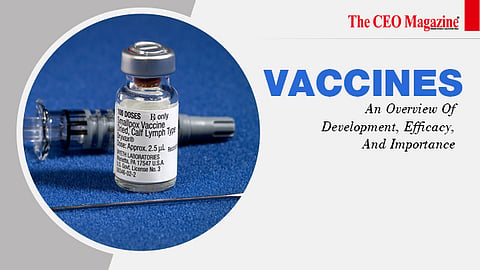
- News
- Women
- Magazine
- IndustryIndustry
- InsightsInsights
- Success Stories
- PublishPublish
- ContactContact
- Media KitMedia Kit

Vaccines
An Overview Of Development, Efficacy, And Importance
Vaccines are one of the most important medical interventions in history, preventing countless illnesses and saving millions of lives worldwide.
This article will provide an overview of vaccines, including their development, efficacy, and importance, as well as some of the challenges associated with vaccine distribution and administration.
Vaccines are biological preparations that stimulate the immune system to recognise and defend against specific infectious agents, such as viruses or bacteria.
They contain either weakened or inactivated forms of the infectious agent or small pieces of its structure called antigens.
When introduced into the body, the antigens trigger an immune response, producing antibodies that can recognise and destroy the actual infectious agent if the person is exposed to it in the future.
Developing a vaccine is a complex process that can take many years and involves several stages, including research, preclinical testing, clinical trials, and regulatory approval.
The research phase involves identifying the most promising antigens and developing a vaccine candidate that is safe and effective. Preclinical testing involves testing the vaccine in animals to evaluate safety and efficacy.
Clinical trials involve testing the vaccine in human volunteers, typically in three phases. Phase I trials evaluate safety and dosage, while Phase II trials evaluate efficacy and safety in a larger population.
Phase III trials involve large-scale testing to determine efficacy and safety in a diverse population.
Once a vaccine has completed clinical trials, it must receive regulatory approval from the appropriate government agency, such as the U.S. Food and Drug Administration (FDA) or the European Medicines Agency (EMA).
The efficacy of a vaccine is a measure of its ability to prevent infection or disease. Efficacy is typically measured in clinical trials and reported as a percentage reduction in disease incidence in vaccinated individuals compared to unvaccinated individuals.
The efficacy of vaccines can vary depending on various factors, including the type of vaccine, the disease being prevented, and the characteristics of the population being vaccinated.
For example, some vaccines, such as the measles vaccine, are highly effective. In contrast, others, such as the flu vaccine, are less effective due to the high variability of the influenza virus.
Vaccines are essential for preventing the spread of infectious diseases and protecting public health. They have been instrumental in eradicating or reducing the incidence of many once-common diseases, such as polio, smallpox, and measles.
Vaccines also help prevent infectious disease outbreaks, such as the recent COVID-19 pandemic.
In addition to their public health benefits, vaccines also have economic benefits. Vaccines reduce healthcare costs and productivity losses associated with illness and hospitalisation by preventing illness.
They also promote economic growth by allowing people to work and participate in society without fearing illness.
While vaccines have been highly effective in preventing disease, many challenges are still associated with vaccine distribution and administration.
These include access to vaccines in low-income countries, vaccine hesitancy, and logistical challenges associated with the distribution and administration of vaccines.
Vaccines are a critical tool in the prevention and control of infectious diseases. They have been instrumental in improving public health and reducing the economic burden associated with illness.
However, many challenges associated with vaccine distribution and administration must be addressed to ensure that everyone has access to life-saving vaccines.
By continuing to invest in vaccine research and development and addressing these challenges, we can ensure that vaccines remain one of the most important medical interventions in history.
Follow us on Google News
